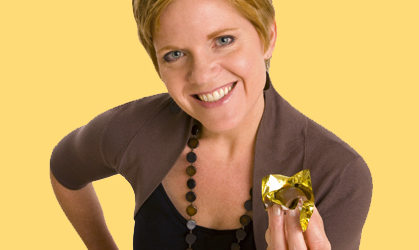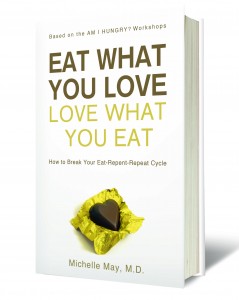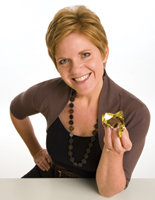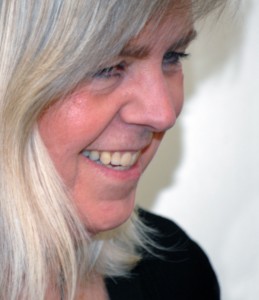
May 4, 2012, Vol. 10, Issue 8
Recently my husband and I went on one of our speaker dates to hear Michelle May, MD, and author of Eat What You Love, Love What You Eat. She was speaking in Salem, Oregon, just 45 minutes from Portland. As most of you know, whenever I get the opportunity to see a speaker in person, I take it. My husband, who used to go along just because it was a date with me, is getting to be a bit of a motivational speaker connoisseur himself. I wouldn’t dare call him a motivational speaker junkie — which I label myself — but I think connoisseur does the job quite nicely. And I’m enjoying sharing the experience and comparing notes.
Michelle May, MD
Eat What You Love, Love What You Eat

Michelle May, MD, is a recovered yoyo dieter and founder of the award-winning Am I Hungry® workshops. In her talks and book, Eat What You Love, Love What You Eat, she guides people out of the food-focused, diet-driven downward spiral that leads people to the cycle of what she calls, “Eat, repent, and repeat.” She offers a powerful alternative: end your love-hate relationship with food and start start eating mindfully and joyfully. Sound good?
Michelle gets people to think about what they’re doing, before they lift their forks. As she pointed out in her talk, “We don’t struggle with knowing what to do, we struggle with decision-making.” As opposed to overeating or restrictive eating, which she also describes as cycles, instinctive eating (Am I hungry?) leads to freedom and flexibility. Her memorable visual for this is a pendulum instead of a yoyo — the extremes of a yoyo being overeating or restrictive eating. In that pattern, you’re either in one or the other, and there’s no in-between. While there are still extremes with a pendulum, it eventually finds a gentle arc somewhere in the middle as it loses energy. “When you finally stop wasting so much of your energy on overeating and dieting, you’ll naturally settle into a more comfortable, settled space, freeing up your energy for more enjoyable, productive and fulfilling activities,” she said.
As Michelle moved us into the concept of mindful eating, she recounted some of the social influencers (double standards) we face daily that keep our minds off of mindful eating.
- We eat for every emotion — happy, sad, glad, disappointed, challenged, nervous, joyful, etc.
- If it’s free, we have to eat it all; if we pay for it, we have to eat it all.
- We think and talk about food all of the time — except when we’re eating it (while eating, we watch television, read, drive, etc.).
- We have a lot of bells that trigger eating.
Her talk was filled with short, memorable take-home snippets that struck home for me. “Nutrition information is a tool, not a weapon,” she said.
And, “When a craving doesn’t come from hunger, nothing will ever satisfy it.”
“Sometimes when I say, ‘I want a brownie,’ I mean, ‘I want a break.’ ‘I want to talk.’ ‘I want to scream.’ And sometimes it means, ‘I want a brownie.’” Can you relate? I can!
 She engaged the audience with frequent audience participation, and all of what she said made perfect, logical sense. She has a way of identifying with the audience so that we felt like she knew us, and she was one of us, with the same foibles, apprehensions and barriers we encounter every day. Here’s what my husband had to say:
She engaged the audience with frequent audience participation, and all of what she said made perfect, logical sense. She has a way of identifying with the audience so that we felt like she knew us, and she was one of us, with the same foibles, apprehensions and barriers we encounter every day. Here’s what my husband had to say:
“When I went with Barbara to hear Michelle May (No one calls her ‘Doctor May.’), I was expecting to hear a good speaker about eating; after all, Barbara doesn’t recommend anyone who isn’t Olympic material. What I didn’t expect was her ability to penetrate to my core with wit but also with respect – her description of how I eat ice cream out of the carton when I’m sneaking it, her appreciation for my own knowledge about my healthy side, and her ability to match her experiences with mine – even though I’m a male. There was a reason she filled that auditorium: she grabbed our attention like a bare wire, and she expanded my potential for living the way I have always really wanted to.”
Also, I wanted to share with you that she’s applied her mindful eating concepts to diabetes self-management in her new book, Eat What You Love, Love What You Eat with Diabetes, co-authored with Megrette Fletcher, M.Ed., R.D., C.D.E.
Rather than radical diets, rigid exercise prescriptions, and complicated medical plans, Dr. May’s system leads patients, through the guidance of their healthcare professional, into building awareness of their decision-making at critical points in their diabetes self-care. Instead of telling them what to do, the system guides them toward curiosity about their own behavior. “Cultivating curiosity, rather than judgment, about diabetes self-management using a series of experiments with eating and physical activity helps the person learn about what works best for them in a given situation,” Dr. May says.
Using the Mindful Eating Cycle, health professionals can identify and redirect their patients or clients away from their familiar restrictive and overeating cycles back to the present moment where choice, opportunity, and change can occur. Approaching diabetes self-care in this fashion helps reduce the client’s harsh critical thoughts, increase their curiosity, and create a natural desire for lifelong learning.
If you’re interested in learning more about Michelle’s availability and topics for speaking engagements, contact me at 503-699-5031 or barbara@speakwellbeing.com Be sure to ask about the chocolate tasting that could be part of your event.
I Don’t Know What I Don’t Know
Last week I was in Stamford, CT, learning and networking with other entrepreneurs like myself. One of my biggest take-aways was, “I don’t know what I don’t know.” There are so many systems and programs available that I could use to make my life easier and my time more productive, but if I don’t know about them, I just keep doing things the same old way. The key to learning that I don’t know what I don’t know was found in the conversations — just mentioning something I was dealing with brought an answer I didn’t know existed. Aha! Light bulb moment! The same thing happens when you bring people together at your special events and conferences. It’s not just about the food, the door prizes, the fundraising, the screenings, the good will, the inspiration or the educational value. It’s about human interaction — sharing and learning from each other, enjoying time with people with shared interests and feeding the genuine need of human beings to help each other. I know I am fed by that. And now that I’ve been nourished, I’m motivated to assist others discover what they don’t know.
Until next time, take care of yourself for your well being and those you love.
Yours truly,
Barbara
 For Your Well Being is published bi-weekly. We bring you insider speaker reports, exclusive stories about special events around the country, meeting planner tips, and fun stuff from the worlds of health and well being. Be well and be in the know!
For Your Well Being is published bi-weekly. We bring you insider speaker reports, exclusive stories about special events around the country, meeting planner tips, and fun stuff from the worlds of health and well being. Be well and be in the know!
The Speak Well Being Group is a specialized speakers bureau, focusing on speakers for hospital-sponsored community events, healthcare organizations, conferences and women’s groups. Our speakers are hand-selected. They are not only experts in their fields, they know how to connect with women and give them life-changing information served on a silver platter of joy, camaraderie, with a side of sauce (spicy, of course).
Finding the perfect keynote speaker for your special event or conference is my personal passion, not just once, but year after year. It brings me endless joy to know that your audience was delighted and moved by the speaker we selected together. I’m committed to making the process easy, pleasant and fun.
